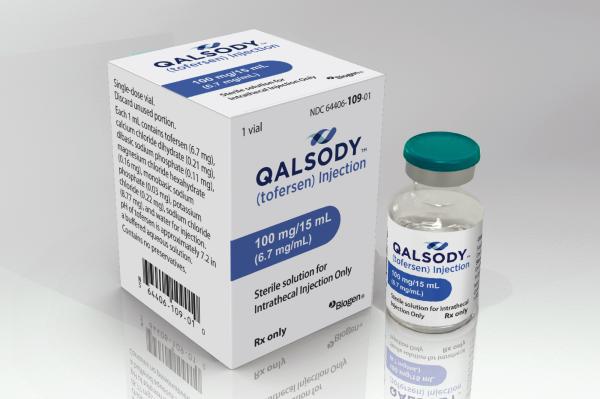Tofersen (Intrathecal)
Generic name: tofersen [ toe-FER-sen ]
Brand name: Qalsody
Drug class: Miscellaneous central nervous system agents
Medically reviewed by Drugs.com. Last updated on Jan 12, 2024.
Uses for tofersen
Tofersen injection is used to treat amyotrophic lateral sclerosis (ALS) in patients with a mutation in the superoxide dismutase 1 (SOD1) gene.
This medicine is to be given only by or under the supervision of a doctor.
Before using tofersen
In deciding to use a medicine, the risks of taking the medicine must be weighed against the good it will do. This is a decision you and your doctor will make. For this medicine, the following should be considered:
Allergies
Tell your doctor if you have ever had any unusual or allergic reaction to this medicine or any other medicines. Also tell your health care professional if you have any other types of allergies, such as to foods, dyes, preservatives, or animals. For non-prescription products, read the label or package ingredients carefully.
Pediatric
Appropriate studies have not been performed on the relationship of age to the effects of tofersen injection in the pediatric population. Safety and efficacy have not been established.
Geriatric
Appropriate studies performed to date have not demonstrated geriatric-specific problems that would limit the usefulness of tofersen injection in the elderly. However, elderly patients are more sensitive to the effects of this medicine than younger adults.
Breast Feeding
There are no adequate studies in women for determining infant risk when using this medication during breastfeeding. Weigh the potential benefits against the potential risks before taking this medication while breastfeeding.
Interactions with Medicines
Although certain medicines should not be used together at all, in other cases two different medicines may be used together even if an interaction might occur. In these cases, your doctor may want to change the dose, or other precautions may be necessary. Tell your healthcare professional if you are taking any other prescription or nonprescription (over-the-counter [OTC]) medicine.
Interactions with Food/Tobacco/Alcohol
Certain medicines should not be used at or around the time of eating food or eating certain types of food since interactions may occur. Using alcohol or tobacco with certain medicines may also cause interactions to occur. Discuss with your healthcare professional the use of your medicine with food, alcohol, or tobacco.
Related/similar drugs
riluzole, Relyvrio, Radicava, edaravone, Rilutek, sodium phenylbutyrate / taurursodiol
Proper use of tofersen
A doctor or other trained health professional will give you this medicine in a hospital. It is given through a needle placed into your spinal cord.
Missed Dose
This medicine needs to be given on a fixed schedule. If you miss a dose or forget to use your medicine, call your doctor or pharmacist for instructions.
Precautions while using tofersen
It is very important that your doctor check your progress closely while you are receiving this medicine to see if the medicine is working properly and to decide if you should continue to receive it. Blood tests may be needed to check for unwanted effects.
This medicine may cause myelitis (inflammation of the spinal cord) and radiculitis (nerve problem). Check with your doctor right away if you have back numbness, pain, tingling, or weakness.
Check with your doctor right away if you have confusion, headache, severe nausea or vomiting, or vision changes. These may be symptoms of papilledema (eye problem) and increased intracranial pressure.
This medicine may cause aseptic meningitis (inflammation of the brain). Check with your doctor right away if you have fever, headache, nausea, stiff neck or back, or vomiting.
Side Effects of tofersen
Along with its needed effects, a medicine may cause some unwanted effects. Although not all of these side effects may occur, if they do occur they may need medical attention.
Check with your doctor or nurse immediately if any of the following side effects occur:
More common
- Arm, leg, or back pain
- difficulty in moving
- joint pain or swelling
- muscle aches, cramps, pains, or stiffness
- nerve pain
- unusual tiredness or weakness
Less common
- Back numbness, tingling, or weakness
- blurred vision
- change in ability to see colors, especially blue or yellow
- confusion
- fever
- headache
- severe nausea or vomiting
- stiff neck
Other side effects not listed may also occur in some patients. If you notice any other effects, check with your healthcare professional.
Call your doctor for medical advice about side effects. You may report side effects to the FDA at 1-800-FDA-1088.
Commonly used brand name(s)
In the U.S.
- Qalsody
Available Dosage Forms:
- Solution
Therapeutic Class: Central Nervous System Agent
Pharmacologic Class: Antisense Oligonucleotide
More about tofersen
- Compare alternatives
- Side effects
- Dosage information
- During pregnancy
- Drug class: miscellaneous central nervous system agents
- Breastfeeding
- En español
Patient resources
Other brands
Professional resources
Other brands
Related treatment guides
Further information
Always consult your healthcare provider to ensure the information displayed on this page applies to your personal circumstances.

